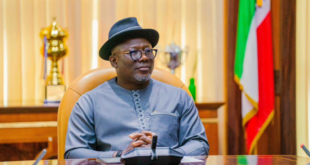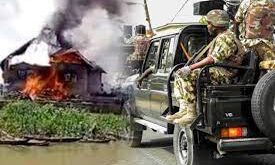By Joseph Onajevwe
The NDDC was created largely as a response to the demands of the Niger Delta people, a populous area inhabited by a diversity of minority ethnic groups. The dreams of the founding fathers of NDDC was to expedite action on the developmental challenges confronting the Niger Delta people, the area where the liquid gold and mainstay of the Nigerian economy are found in commercial quantities.
The Commission was aimed at offering a lasting solution to the socio-economic difficulties of the Niger Delta Region and to facilitate the rapid and sustainable development of the region that is economically prosperous, socially stable, ecologically regenerative and politically peaceful. Yet, the area was inhabited by the minority ethnic people of the southern belt in Nigeria with little of the East, the number three in terms of population size in Nigeria, being part of the host to the oil wells and activities of the oil majors.

Prior to the establishment of the Commission, Nigeria had identified the minority question early enough when the Niger Delta Development Board was established to address the unique characteristics of the Niger Delta as spurred by the Sir Henry Willinks Commission’s recommendation of 1958 that the Federal government of Nigeria deserves to give the region special attention. In response, the Federal government established the NDDB in 1960 to manage the development challenges of the region.
The persistent agitation for a renewed development strategy in the Niger Delta region gave birth to the presidential Task Force (1.5% committee) in 1980. The Shehu Shagari administration, therefore, allocated 1.5% of the Federal accounts to the committee to be dedicated to the development of the region. Although the PTF existed until 1985/1993, nothing much was achieved except few projects that had little impact on the welfare of the oil-producing communities in the region.
Another attempt at addressing the Niger Delta question is the Oil Producing Areas Development Commission (OMPADEC) designed to calm the growing restiveness in the region. In 1992, President Ibrahim Babangida increased the derivation to the Niger Delta from 1.5% to 3% all in a bid to tame the growing restiveness in the area. With this development, three per cent (3%) of the federal oil revenue was allocated to OMPADEC to address the development challenges of the region. Due to lack of focus, inadequate and irregular funding, official proficiency, corruption and excessive political interference, lack of transparency and accountability and high overhead expenditure, the commission could not achieve much. The commission, however, completed several projects but many were abandoned. Between 1992 and 1999 it was wound up.
Following the failure of government attempts at giving special attention to the Niger Delta region, the Niger Delta Development Commission was established in 2000. The commission was meant to be an interventionist agency established by the former President of Nigeria, Chief Olusegun Obasanjo. His administration recognized the neglect of the Niger Delta Region when he stated that, “since the inception of our administration in 1999, we have consistently acknowledged the critical essence of Niger Delta to the economic wellbeing of Nigeria, and committedly striven to redress the visible underdevelopment and neglect of the past in the region”.
From the foregoing, it is clear to all that the Niger Delta Region has assumed considerable attention and importance both nationally and internationally because of its socio-economic challenges and opportunities of a rich ecosystem and tremendous natural resources; especially petroleum and gas that abound in the Region. On this ground, the Commission was officially inaugurated in 2000 with the vision to offer a lasting solution to the socio-economic difficulties of the Niger Delta region. Its mission includes facilitating the rapid, even and sustainable development of the Region.
Over the years, the commission had executed several projects across the nine states of the Niger Delta in the areas of road and land reclamation; bridges, building of schools, creation of employment, training and retraining of relevant manpower for a sustainable approach to the developmental needs of the people, scholarship, local and foreign to deserving students to institutions all over Nigeria and abroad and many other areas of intervention. The Commission has maintained that it has executed thousands of projects ranging from roads and bridge construction to shore protection and hospitals. What cannot be denied, however, is that over 1000 minor infrastructural projects targeted at addressing various developmental challenges have also been undertaken and are either completed or at various stages of completion.

However, the impact of the commission has been negligible compared to what had been voted over the years. Official corruption continues to impede the speed of work in the interest of the people. The struggle for power and control of the commission by power brokers is another reason for the underperformance of the commission. For over two years, no Board has been inaugurated for the Commission in line with the extant laws establishing it rather, sole administrator, or interim board had been in place for over two years, opening the vault for few hands who are not accountable to the people, but the Niger Delta Minister, to whom the Commission was ceded under President Muhamadu Buhari. Even when a Board was nominated, screened by the National Assembly and duly cleared, the Board has not been inaugurated to date.
What this implies is that the Commission, with its eleven departments including Directorates, exist including the Directorate of Administration and Human Resources; the Directorate of Community and Rural Development; the Directorate of Utilities Infrastructural Development and Waterways; the Directorate of Environmental Protection and Control; The Directorate of Finance and Supply; The Directorate of Agriculture and Fisheries; The Directorate of Planning, Research, Statistics and Management Information System; The Directorate of Legal Services; The Directorate of Education, Health and Social Services; The Directorate of Commercial and Industrial Development and The Directorate of Projects Monitoring and Supervision, are all under the management of one sole administrator appointed by the Niger Delta Minister. How can Nigeria make progress with such a degree of impunity that gives an official stamp of authority to power-mongers at the expense of the common interest of the Niger Delta people?
The lofty ideas behind the establishment of the Commission are being wasted on the altar of primitive politics and ego. The overall score of the quality of projects delivered by the commission is less than average. The outcome and impact fall below expectation. The frustrations and disappointments elicited by the failure of the NDDC had over time provoked tensions amongst the people particularly the Ijaws who had engaged the Nigerian government and multinational oil companies in the region in periodic altercations. Their grievances are justified by the extensive environmental degradation and pollution from oil activities that have operated in the region since the 1950s. These minority communities of oil-producing areas have received little or no currency from the multi-billion dollar a year industry which lines the pockets of foreign multinational and corrupt government officials, environmental remediation measures are limited and negligible. The region is highly underdeveloped and is rated poor even by Nigerian’s low standards for quality of life.
Many see NDDC as another white elephant agenda from the Federal Government to deceive the Niger Delta people. The commission has been reduced to a place for a free meal. Largely, this perception has not fully given way. Despite efforts of the management of the commission to prove that it is not out to give a free meal, the way and manner it is being tossed about lend credence to the perception that the commission is there only to give out money for work not done. People are more interested in collecting money to share and not how such money can be collectively earned and expanded to address developmental issues. A contractor moves into a particular community but the people will not allow him to work until he pays them a certain amount of money because they do not see the project as theirs, they see it as an NDDC project. This has continued to breed the abandoned project syndrome.
To put NDDC back on track, the Board should be inaugurated without any further delay. The idea of sole administrator is alien to the establishment of the commission. The Commission deserves better management and focuses so as to justify the demand for increased funding. The Niger Delta region deserves better attention but the little available must be judiciously applied to make better use of the opportunity available through the commission.
Joseph Onajevwe writes from Ginuwa Road, Warri, Delta State.
Subscribe to the Advocate News letter and receive news updates daily in your inbox.
 Advocate.ng Latest news update on politics, entertainment, sport and more
Advocate.ng Latest news update on politics, entertainment, sport and more



